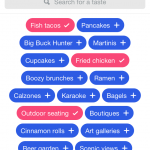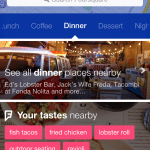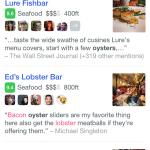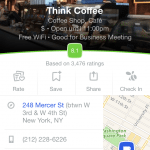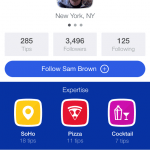Skift Take
This is the first version of Foursquare we can see ourselves using. The personalization features make it easier to discover places that are likely right for you.
- Users can tick off their favorite types of things in order to get more personalized local discovery.
- The new homescreen offers quick links to local favorites.
- Search results highlight which points of interest people you follow know.
- The new point of interest profile page can link users to the Swarm app for checkins.
- On the new Foursquare, you follow users like you do on Twitter, not Facebook.
In late July Foursquare released a new logo and provided an early look at a radically new version of the one-time social checkin app.
The announcement followed earlier news that the company was splitting its product into two: A local discovery app called Foursquare and a social discovery and checkin app called Swarm.
The split allows Foursquare to focus the namesake product on local discovery, putting it up against both Yelp and Google Maps as a go-to source for discovering the world around them, and the new product on a type of social networking that’s more about discovering people you know than finding a great new spot for dim sum.
Foursquare is splitting off the social aspect of the service — which many users were turned off by or rarely used — in order to bring in a much larger group of people who simply need recommendations to help find things around them.
And Foursquare has a big world to choose from indeed. Years of checkins have seeded the service with a rich database of over 60 million points of interest — hotels, shops, restaurants, attractions, and the like — all over the world. The focus on data around places as opposed to editorial reviews (Foursquare has a single-digit editorial team) means that the service is constantly updated by people on the ground and categorized by their favorite things about theses places.
Outside of spinning off the checkin to Swarm, the biggest change is how users interact with one another. Gone is the Facebook-like action of inviting friends to follow one another, replaced by the Twitter-like follow of brands and people with similar interests or a particular expertise. See someone who has shared insight into tacos and dive bars? Follow her without feeling like a stalker, and her recommendations will be sorted higher in your search results.
Users earn badges based not on checkins, but on the number and quality of tips they share.
As with the old app, Foursquare is best in urban areas. But since it is based primary on user-generated content it doesn’t require Foursquare to “open” in a destination (like Yelp) before there is information there.
Introducing the all new Foursquare from Foursquare on Vimeo.
The Daily Newsletter
Our daily coverage of the global travel industry. Written by editors and analysts from across Skift’s brands.
Have a confidential tip for Skift? Get in touch
Tags: foursquare, local


